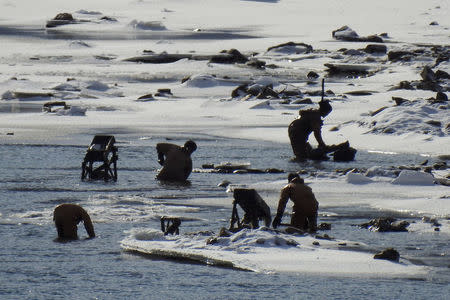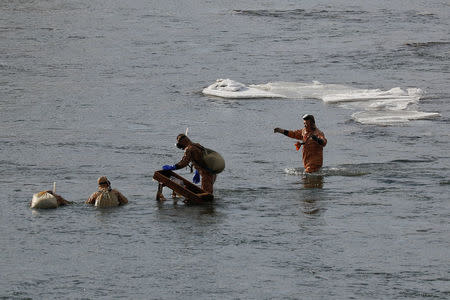Special Report: The Cold Frontier, Part Three - A journey along North Korea's edge
By Sue-Lin Wong and Damir Sagolj
(Reuters) - Not far from Linjiang, people in thin, head-to-toe rubber suits were diving in the river. Locals said they were part of North Korea's smuggling operations.
We couldn't figure out what the divers were doing - mending pipes in the river bed, fishing? One local walking along the Chinese side of the river bank was happy to fill us in.
"They're mining for gold," he said.
"Are they Chinese or North Korean?" I asked.
"Ha! They're North Koreans. Chinese aren't desperate enough to resort to earning money like that."
We saw men in military uniform watching over the divers. Defectors have said "Office 39," a North Korean entity that procures luxury goods for the Kim family, has a hand in the gold mining business, exporting gold as a way to raise hard currency.
Each corps in the military and security ministry does this kind of gold mining, panning for gold in rivers and streams, wrote Kim Kwang-jin, a North Korean defector, in a report by the U.S.-based Committee for Human Rights in North Korea.
North Korea has many things desired by the Chinese, locals told me. Not just gold but also copper ore, iron ore, aluminium, charcoal, timber, pine nuts, hazelnuts, seafood and pine mushrooms. In the 1990s, traders just needed to give the border patrols on both sides of the river a small bribe. Now, things have tightened up.
But United Nations monitors have said North Korea violated sanctions to earn nearly $200 million in 2017 from banned commodity exports. We asked the North Korean mission to the United Nations for a comment but they didn't respond.
AN UNDERGROUND MARKET
North Korea has an estimated 2,000 tons of gold reserves, the sixth-largest in the world, according to South Korea's state-run Korea Resources Corporation. This region accounts for more than 60 percent of them, according to the South Korean government.
United Nations Security Council sanctions were imposed on gold from North Korea in 2016 and there are no official gold exports from North Korea to China, the Korea Trade-Investment Promotion Agency says.
Locals said North Koreans dive for gold here every day, in summer and in winter. The equipment is pretty basic. In the past, there was a large underground market for gold in Sinuiju, the largest city on North Korea's border with China, according to North Korea expert Andrei Lankov.
AMERICAN ENTERPRISE
Back in the day, gold mining in North Korea was an American industry.
From 1895 to 1939, the Oriental Consolidated Mining Company (OCMC) operated a mine in Unsan, near Pyongyang, which became "the most lucrative enterprise of its kind in Asia," according to an article by historian Spencer J. Palmer in 1962. South Korea's Ministry of Unification said in its archives the Unsan mine was "first-rate."
A Japanese firm bought it in August 1939, according to Robert Neff, an expert in the history of Western mining in Korea - historians say they got it for a discount off their final instalment, ahead of America's war with Japan. We couldn't tell if it is still in operation today.
NOBEL PRIZE WINNER
In the early 1900s, an American company town sprang up near the Unsan mine. Thousands of American engineers and managers lived with their families there. Charles Pedersen was one of them, born in 1904 to a Norwegian engineer and a Japanese mother.
Pedersen discovered a way to bind atoms and make new compounds which earned him the Nobel Prize in Chemistry. He remains the only person born in Korea to have won a Nobel Prize in Science.
HOOVER'S BAR BILL
Pedersen wrote in his biographical notes for the prize that because the mines were administered by Americans, there was an effort to make life there as American as possible.
Herbert Hoover, who would later go on to be president of the United States, visited in 1910 when he was working for a Chinese-based gold mining company, said Neff.
"While he was in Korea, he ran up a large bill at OCMC's bar and then skipped out without paying," Neff told me, citing interviews with gold miners.
'MADE IN CHINA'
Many people we met on the border said various goods are produced in North Korea and re-labelled as 'Made in China' here before being sold to the rest of the world. China has declined to comment, but this is something I've often been told on the border.
Since Kim Jong Un stepped up weapons tests in 2017, the United Nations has ratcheted up sanctions and China has been enforcing them vigilantly. Patrols roam the cities along the border, so most illegal trading takes place under the cover of night in quiet villages.
"Come autumn, there's a lot of illegal trading that goes on at night time," said Li Peng, an electrician in Linjiang.
Another trader told me the thing the North Koreans most want is renminbi, the Chinese currency. "It's their currency of choice, all along the border with China. Their money isn't really worth anything anymore."
ANYONE FOR PINE NUTS?
"All kinds of things get traded," said the man we met at Hekou, as he pointed to a North Korean soldier across the frozen river. "I know him," he said, "and I know all of his colleagues. I sometimes go over to visit them."
But a Chinese businessman we met in Changbai County complained that now, he can only deal in pine mushrooms and pine nuts, which he sells to the United States, Japan and South Korea. "The U.S. just want mid-range pine nuts," he grumbled. "We'd make more money if we could sell them high-range nuts." The United States and some other countries ban products made inside North Korea, as well as those using North Korean ingredients.
"North Korea has lots of things to sell us," the businessman said. "The problem right now is they aren't allowed to sell us many things."
(Edited by Sara Ledwith)



